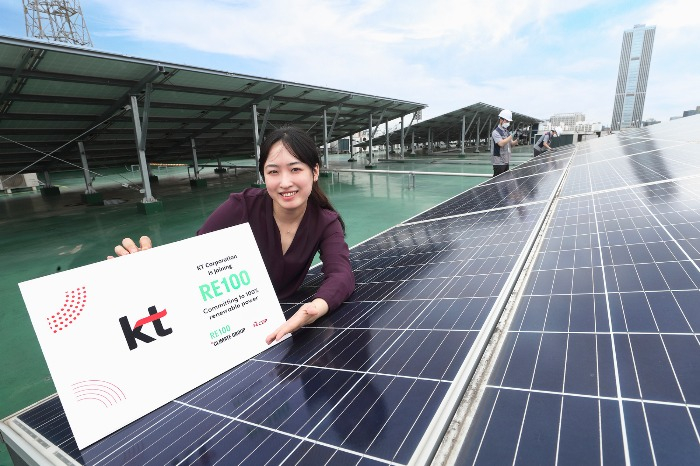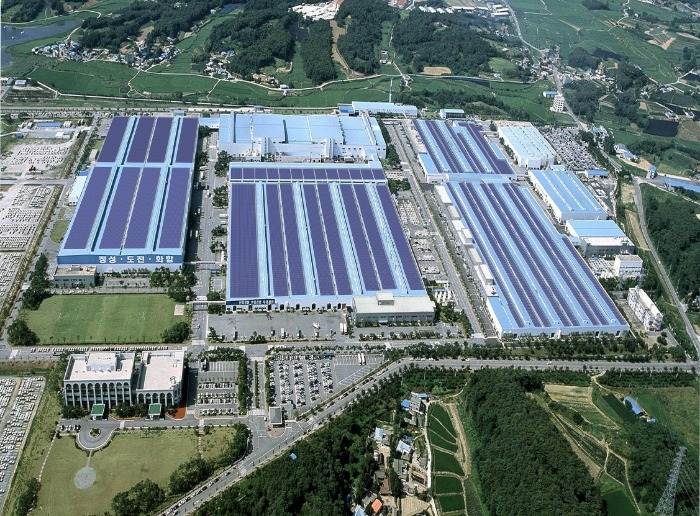Carbon neutrality
Soaring renewable energy costs haunt top Korean firms
Renewable energy consumption by top companies jumped in 2021, with their CO2 emissions up sharply as well
By Jul 26, 2022 (Gmt+09:00)
3
Min read
Most Read
LG Chem to sell water filter business to Glenwood PE for $692 million


Kyobo Life poised to buy Japan’s SBI Group-owned savings bank


KT&G eyes overseas M&A after rejecting activist fund's offer


StockX in merger talks with Naver’s online reseller Kream


Mirae Asset to be named Korea Post’s core real estate fund operator



Major South Korean conglomerates are stepping up efforts to switch to renewable energy, driving their electricity costs sharply higher amid low supply of carbon credits.
In accordance with the environmental, social and governance principles, a growing number of Korean companies have joined the RE100 initiative. The campaign, initiated by a London-based organization, targets a net-zero emission in the manufacturing process by 2050.
But the rising price of renewable energy certificates (RECs) are adding to pressure on the RE100 members in South Korea.
To reach their commitments to the RE10 pledge, they need to buy RECs from power providers on the open market since they have yet to reduce carbon emissions.
RECs are market-based instruments that certify one megawatt-hour of electricity generated from a renewable source ranging from solar and wind energy to biomass, or fuel derived from plants.
Their price almost doubled over the past year.
The Climate Group in London kicked off the RE100 campaign in 2014. Over 370 companies around the world made a commitment to the initiative.
To maintain their membership, they must switch to renewables for 60% of their electricity consumption by 2030 and then 90% by 2040, or buy RECs from power providers on the open market.
REC PRICES
The REC price spiked to an average of 56,000 won ($43) on July 21, up 86% on-year from a year earlier, according to the Korea Power Exchange.
The surge in the price was blamed on the introduction of renewable portfolio standard (RPS) to state-run companies. The regulation requires them to boost renewables to 12.5% of their energy consumption this year from 9% in 2020.
Other than the RECs, companies are able to resort to the power purchase agreement (PPA). Under the agreement, power utility KEPCO Co. buys electricity from energy generators for sale to companies.
But the PPA charges higher fees and does not properly reflecting market demand and supply, compared with RECs.
Alternatively, companies may use the Green Premium, paying the difference in cost between producing greenhouse gases and not producing them. But the premium fails to acknowledge companies’ efforts to reduce greenhouse gases.

SAMSUNG, LG AND HYUNDAI
Last year, South Korea’s top 30 companies emitted their largest-ever amount of carbon dioxide.
At the same time, however, their consumption of renewable energy increased as they ramped up production to pre-pandemic levels.
Samsung Electronics Co., South Korea’s largest company by market value, consumed 5,278 Gigawatt hours (GWh) in 2021, up 30% from the year previous.
Renewables make up one-sixth of Samsung’s energy consumption. The world’s top memory chip and smartphone maker is expected to join the RE100 campaign later this year.
By comparison, renewable energy consumption by LG Electronics Inc. has trebled to 252 terajoules (TJ) on-year in 2021. That reached one-seventh of its electricity usage, according to its 2021 sustainability report.
A TG is a unit of energy consumption in the International System of Units. The home appliances manufacturer has yet to become a RE100 member.
Hyundai Motor Co. recently joined the RE100 initiative. Last year, its renewable energy consumption nearly doubled to 120,171-megawatt hours versus the year previous.
“Starting last year, major conglomerates sharply increased renewable energy consumption,” said an industry insider.
“Such trends were notable among B2C companies and those with heavy exposure to foreign markets
However, a power industry official complained that the environmentally-friendly energy price is determined mainly by suppliers, coupled with insufficient supply.
To meet a surge in demand, the government needs to revise the current renewable energy supply and trading systems, he said.
Write to Hyung-Suk Hong and So-Hyeon Kim at click@hankyung.com
Yeonhee Kim edited this article
More to Read
-

-
 Carbon neutralityTop S.Korean firms face carbon neutrality dilemma
Carbon neutralityTop S.Korean firms face carbon neutrality dilemmaJul 04, 2022 (Gmt+09:00)
3 Min read -

Comment 0
LOG IN


